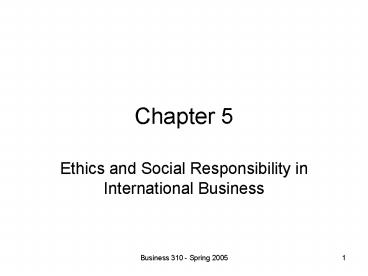Ethics and Social Responsibility in International Business - PowerPoint PPT Presentation
1 / 24
Title:
Ethics and Social Responsibility in International Business
Description:
Identify the key elements in managing ethical behavior across borders ... code for all units around the globe or tailor the code to each local culture ... – PowerPoint PPT presentation
Number of Views:1094
Avg rating:3.0/5.0
Title: Ethics and Social Responsibility in International Business
1
Chapter 5
- Ethics and Social Responsibility in International
Business
2
Chapter Objectives
- Describe the nature of ethics
- Discuss ethics in cross-cultural and
international contexts - Identify the key elements in managing ethical
behavior across borders - Discuss social responsibility in cross-cultural
and international contexts
3
Chapter Objectives
- Identify and summarize the basic areas of social
responsibility - Discuss how organizations manage social
responsibility across borders - Identify and summarize the key regulations
governing international ethics and social
responsibility
4
Exporting Jobs or Abusing People?
- Fruit Juice sold to Minute Maid, Tropicana,
Nestle - Soccer balls produced by 8 yr olds in Mexico
- Nike Asian child labor and unsafe conditions
- Ethical dilemmas
- Balance responsibility to stockholders against
that to society
5
What is Ethics?
- An individuals personal beliefs about whether a
decision, behavior, or action is right or wrong - Ethical behavior viewed from a societal
perspective what does society consider ethical?
6
Ethical Behavior - Generalizations
- Different to different people
- Usually similar beliefs within a culture
- May depend on context
- Vast differences among cultures
- e.g. bribes
- 2002 survey Russia, China, Taiwan, South Korea
vs. Australia, Sweden, Switzerland, Austria,
Canada
7
Three Elements of Ethics
- (1) How does the organization treat employees?
- (2) How do employees treat the organization?
- (3) How do the organization and employees treat
other economic agents?
8
How does the organization treat employees?
- Hiring and firing
- Solely on ability and performance?
- Wages and working conditions
- Employee privacy
- Opportunities for development
9
How do employees treat the organization?
- Conflicts of interest
- Gift giving and receiving
- Secrecy and confidentiality
- Laws restricting disclosing sensitive info to
rivals - Ethics of using this sensitive info
- General honesty
10
Employee and Org. treatment of other economic
agents
- Bribery
- Pricing
- Financial disclosure
- Advertising practices
11
Company ethics how to influence employees
- Code of ethics
- Detailed how employees treat suppliers,
customers, competitors, others - MNCs must decide whether to establish an
overarching code for all units around the globe
or tailor the code to each local culture - MNCs will often be held to the home country or to
international standards - Current efforts to establish international ethics
standards (through International Organization for
Standardization ISO)
12
Company Ethics (cont.)
- Ethics training
- Cannot anticipate all potential ethical dilemmas
and put in a code - UPS managers continuously receive ethics
training, are directly responsible for training
other employees - Code of conduct, ethics training manuals have
been translated into 29 languages
13
Company Ethics (cont.)
- Organizational practice and corporate culture
- How does top management act?
- How does the organization respond to whistle
blowers?
14
Social Responsibility
- Broader than ethics responsibility to protect
and enhance society - Areas of social responsibility
- Organizational stakeholders directly affected
by practices and have a stake in perf. - Customers
- Employees
- Investors
- Environment
- General social welfare
15
Map 5.1 Social Responsibility Hot Spots
16
Figure 5.3 Approaches to Social Responsibility
Most Responsible
Least Responsible
Obstructionist Defensive Accommodative
Proactive
17
Obstructionist Stance
- Do as little as possible to address social or
environmental problems - Hide Questionable Behavior
- Deny or avoid responsibility
- Examples
- Astra
- Nestle and Danone
18
Defensive Stance
- Do what is required legally, but nothing more
- Corporate responsibility is to generate profits
- Example
- Philip Morris
19
Accommodative Stance
- Meet ethical and legal requirements and more
- Agree to participate in social programs
- Match contributions by employees
- Respond to requests from non-profits
- No proactive behavior to seek such opportunities
20
Proactive Stance
- Strong support of social responsibility
- View themselves as stewards and look for ways to
contribute - Examples
- McDonalds
- Merck
21
Implementing Social Responsibility
- Legal Compliance
- Appropriate functional managers
- Ethical Compliance
- Philanthropic Giving
22
Informal Dimensions of Social Responsibility
- Leadership
- Create organizational culture
- Example Johnson Johnson
- Whistle-blowing
- Does the organization take it seriously?
- Do they punish whistle blowers?
- Affected by culture e.g. Japan
23
Corporate Social Audit
- Tool for the evaluation of social responsibility
effectiveness - Formal and thorough analysis
- Define goals, analyze resources devoted to goals,
evaluate effectiveness, make recom. - Conducted by task force
24
Regulating International Ethics and Social
Responsibility
- Foreign Corrupt Practices Act (1977)
- Alien Tort Claims Act (1789)
- U.S. MNCs resp. for human rights abuses of
foreign govts. - Unocal citizens of Burma suing over the use of
forced labor - Anti-Bribery Convention of the Organization for
Economic Cooperation and Development (OECD) - Elim. Bribery in intl. bus.
- International Labor Organization (ILO)
- Monitors working conds. in developing countries































